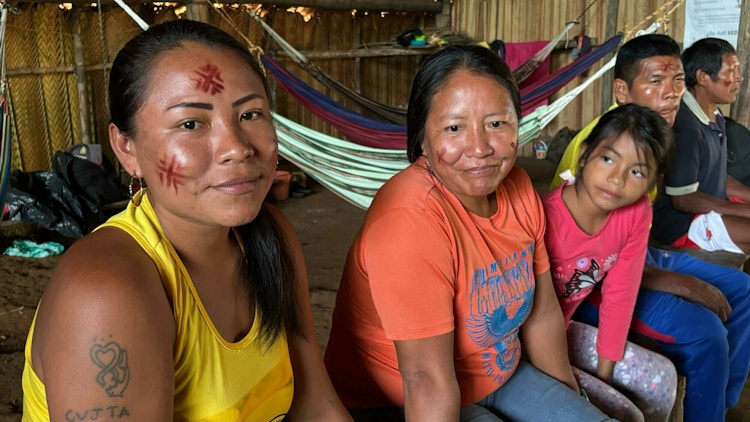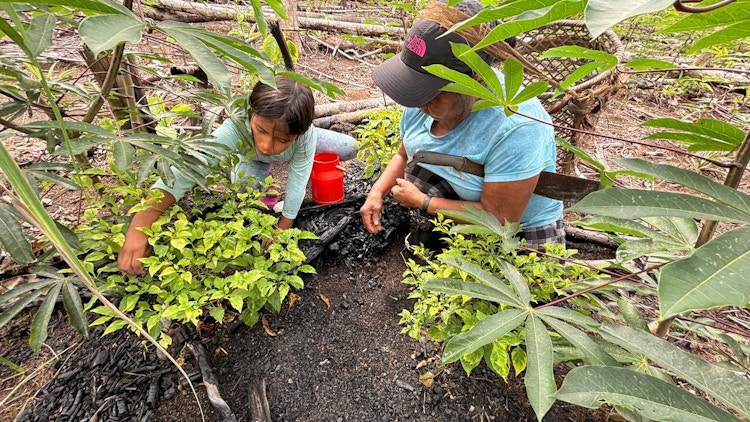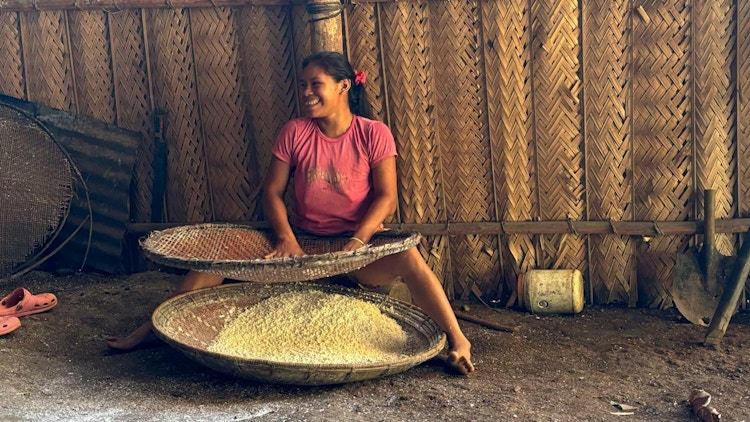Indigenous activist Patricia Suarez
Weaving solutions through thought and action
Resistance is creating a space where Indigenous women can act as stewards of the land. Patricia Suarez’s mission, as well as that of Indigenous women, is to protect life in the Colombian Amazon.

Patricia Suarez. Photo: OPIAC
By Rainforest Foundation Norway.
"What is happening is serious. Entire villages today see their traditional sources of sustenance disappearing. The threat to our physical and cultural survival is growing every day"
Patricia Suarez, Organization of Indigenous Peoples of the Colombian Amazon
Indigenous peoples in Colombia watch the threats that continue to come from outside their territories with great concern; Mining, logging, deforestation, fishing, and hunting on a large scale upsets the sacred balances of the ecosystems.
Patricia Suarez was born and raised in the Indigenous Murui-Muina village of San Rafael in
the Colombian Amazon. Remaining a quiet observer of the destruction of the rainforest was never an alternative for her.
"From the first breath we as Indigenous women take at birth, we carry with us the mandate to protect our territory and weave the balance between nature and our communities", Suarez says.
Today, as an advisor to OPIAC (The Organization of Indigenous Peoples of the Colombian Amazon), one of Rainforest Foundation Norway’s partner organizations in Colombia, Suarez coordinates a crucial initiative—the Legal Security Plan for the Protection of Indigenous Territories.
As the Technical Secretary of the National Commission for the Protection of Isolated Peoples, Suarez works to defend the rights of Indigenous Peoples against threats such as encroachment, violence, and exploitation.
Despite the increasing pressures, Suarez maintains faith in the power of change;
"We are weaving solutions through thought and action. This is our resistance as Indigenous women of the Amazon" she says.

"From the first breath we as Indigenous women take at birth, we carry with us the mandate to protect our territory". Photo: OPIAC
Women of cold words, beautiful thoughts, and sweet Herats
For Suarez and her community, a crucial part of the resistance to outside threats is creating spaces where they can act as stewards of the land, making decisions based on the wisdom of their ancestors and preventing outsiders from dictating the fate of their homelands.
"We are daughters of sweet manioc, of chili peppers, of peanuts", she says, reflecting the agricultural foundation of her people's identity.
"This is how we feel and recognize ourselves: We are women with cold words, beautiful thoughts, and sweet hearts, as our grandparents taught us. From this way of seeing ourselves, we contribute to life and maintain the balance in our territories."

A crucial part of the resistance to outside threats is creating spaces where Indigenous women are heard, and where they can act as stewards of the land, making decisions based on the wisdom of their ancestors. Photo: OPIAC
Physically, Suarez has moved away from her village and into the city. The move has not taken away her connection to the land, nor has it changed her purpose - the mandate to take care of it.
She sees herself as a bridge that helps non-Indigenous society understand “the collective dreams of Indigenous peoples” and builds recognition for the crucial role of Indigenous communities and the management of their territories.
"Our political thinking is not born in offices nor academic spaces, but in dialogue with the land, the river, the seeds, the words of our grandparents, and the struggles we have inherited", she explains.
"These territories – that many call remote or invisible – are the heart of life. From there, the world is governed and the life of the planet is balanced. If they do not understand this, they will hardly understand that it is not possible to talk about the future, biodiversity, or climate solutions without recognizing the role of Indigenous peoples and the role of Indigenous women in particular".

Learning to take care of the rainforest and the life it supports begins at birth - with knowledge passed down from their ancestors. Photo: OPIAC
UN recognizes women's role as biodiversity stewards
In recent years, the voices of Indigenous women have gained some recognition – both in Colombia and internationally. Recently, Indigenous leader Lena Estrada was appointed as Minister of Environment in Colombia. At the UN biodiversity conference, COP 16 in Cali, Ginny Alba from the Piratapuyo People was the first Indigenous negotiator within Colombia’s official delegation, marking another important step.
The global recognition at COP 15 in Montreal, which adopted a separate target on gender and a Gender Plan of Action for biodiversity, marked a historic step in acknowledging women's role as stewards of the earth. Yet Suarez is clear: there is still a long road ahead.
"When the role of Indigenous women in caring for life and defending territories is not acknowledged, we are directly excluded from the spaces where decisions are made and where public policies are constructed that define the future of our peoples and the planet," she says. Suarez views the marginalization of Indigenous women not as accidental, but rather a form of historical violence.

Patricia Suarez (third from the left) and colleagues. Photo: OPIAC
Caring for nature is a way of being
Suarez’s demands are simple but powerful: Indigenous women must be treated not as mere footnotes or token representatives, but as active political agents with the right to make decisions, propose solutions, and receive the resources needed to continue their work:
"We come to these spaces not asking to be saved, but to share our own vision of life and of the world, to defend our forms of territorial governance, and to show that the future of the Amazon and of the planet is only possible if the world recognizes and respects the wisdom, the care and the self-government of Indigenous peoples".
Suarez emphasizes the clear difference between how Indigenous women approach the protection of biodiversity and how this differs from – and complements – the mainstream.
"For us, caring for biodiversity is not a program or a project; it is
a way of being and being in the world. This is what we bring to these
international spaces today: the living memory of what it means to take
care of the planet from the roots and heart".

"We are daughters of sweet manioc, of chili peppers, of peanuts". Photo: OPIAC

"Rainforest Foundation Norway is proud to work alongside Patricia Suarez and other Indigenous women, supporting their vital efforts to protect the rainforest and the future of all life on this planet. Their tireless advocacy, strength and resilience continue to inspire and remind us that the Amazon's future - and of our planet - rests in the hands of those who have always known how to protect it".
Toerris Jaeger, executive director of Rainforest Foundation Norway